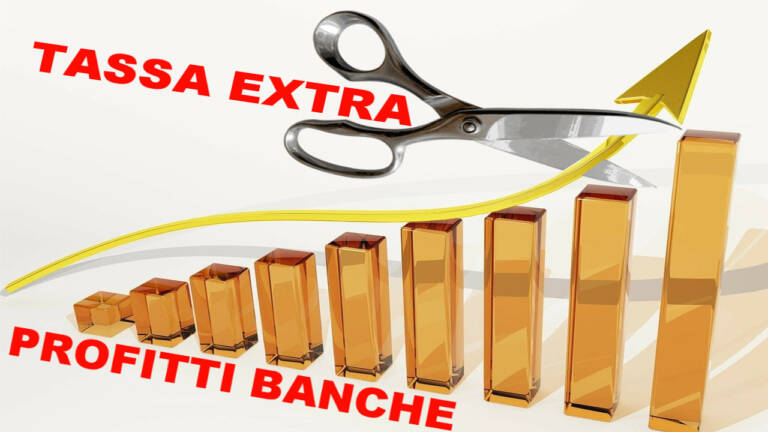Is taxing the extra profits of banks good or bad?

The tax on bank extra profits, introduced without warning by the Meloni Government, is generating a very heated debate, with two opposing sides: on the one hand, citizens and businesses, who largely agree, given their experience with banks, on the other hand journalists and mainstream experts who scramble to criticize a measure that goes against the interests of banks and financial markets.
Many previous governments raised taxes on various sectors of the economy, but no one had ever had the courage to touch the banking sector, which undoubtedly enjoys considerable privileges.
In this interview with Marco D'Agostino of Visione TV, I try to go into the merits of the tax on bank extra profits, trying to disavow all the criticisms that have been leveled by mainstream experts, who being mostly on the payroll of institutions financial institutions and banks, cannot avoid doing so.
The problem is crucial and considered taboo by many: today almost all the money we use is created out of thin air by the private banking system with loans and interest, generating a mathematically unquenchable debt that grows exponentially due to interest.
The problem is that banking cannot be assimilated to any other productive activity, because banks generate money from nothing authorized by the State and the ECB, therefore they perform an important public function in the name and on behalf of the population, that of creating money without which we could not carry out the exchange of goods and services, nor pay taxes.
Among other things, the neoliberals who defend the free market so much should ask themselves a few questions about the banking system, which increasingly resembles an oligopoly, where if the banks earn, the profits belong to the shareholders, while if they lose, they are saved by the State and therefore by the community.
Classic example of privatization of profits and contemporary socialization of losses.
The shareholders of the banks are almost always the same and tend in every way to defend their corporate interest, being able to count on the fact that there is no free market in the banking sector, because the supply of loans is conditioned by the choices of the ECB , which with the increase in interest rates determines the cost of money and favors the increase in bank profits.
The criticisms made by journalists and mainstream experts, from the loss of value of bank shares on the stock exchange, which only concerns financial speculators, to the fact that this measure could cause an increase in the cost of money, which instead mainly depends on the choices of the ECB, they are all instrumental and advanced only to try to protect the interests of the financial markets and banks.
The reality is that the introduction of a tax on bank extra profits by the Government marks a significant change of pace and we hope that, as promised, it will be used to reduce the cost of mortgages for families and to reduce taxation in general.
But that's not enough, for every extra profit of the bank, there is always an extra cost for families and businesses. So it's okay to tax the extra profits, but we also need to reduce the extra costs for the citizens, putting a ceiling on the interest rates applicable by the banks, to prevent this situation from causing excessive damage to the economic system which will then also have repercussions on the state budget , due to reduced domestic demand, GDP and tax revenues.
If the Government then wanted to raise the bar, it could introduce two innovations that would have a greater impact on the real economy and especially for citizens:
- introduce Savings Current Accounts with the Treasury, which can remunerate the savings of Italians, offering them a more convenient alternative to keeping money in bank current accounts, which today yield less than zero;
- expand the public bank Medio Credito Centrale MCC by also acquiring Monte dei Paschi di Siena MPS, which is already 68% state-owned, to have branches throughout Italy, after acquiring Banca Popolare di Bari, which provided it with branches only in the center -south.
Matteo Salvini also said it at the press conference, also confirmed by Giorgia Meloni, that “The ECB's rate hike has led to an increase in the cost of money for households and businesses. There hasn't been an equally diligent, fast and important increase for consumers”.
If the government wants to reduce the cost of money for households and businesses, it must create viable alternatives to the private banking sector, in order to break the current oligopolistic regime.
With the Current Savings Accounts, the State creates a valid and well-paid alternative to the purchase of BTPs, allowing a substantial part of the financial wealth of Italians to be diverted to the Treasury, but with guaranteed capital and without generating fluctuations on the financial markets.
With the expanded public bank MCC+BPB+MPS, new loans can be created for the real economy, especially for families in difficulty and small and medium-sized enterprises, as was done by the German KfW, which in 2020 was able to create a good 820 billion euro to stimulate growth.
We are witnessing important innovations that are starting to put the creation of money, which until now was considered taboo, at the center of the problem.
We will see if the Government will have the creativity, ability and courage to go forward on this path or will backtrack.
Posterity will judge …
Paolo Becchi and Fabio Conditi

Thanks to our Telegram channel you can stay updated on the publication of new articles from Economic Scenarios.
The article Taxing bank extra profits, is it good or bad? comes from Economic Scenarios .
This is a machine translation of a post published on Scenari Economici at the URL https://scenarieconomici.it/tassare-gli-extra-profitti-delle-banche-e-un-bene-o-un-male/ on Mon, 14 Aug 2023 10:13:13 +0000.
